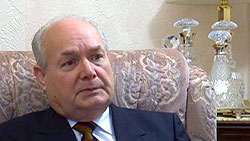 |
| Private Ron Harper |
We then went for retraining at Selarang, then that is where I actually finished my training and qualified as a signaller and then was posted to D company as 11 platoon company. There I was on various patrols. Notably we were put to a platoon outpost in a village called Layang Layang which was alongside the railway. Very exposed. The other side of the railway was rubber plantation so we were very exposed to attack. So we had to be on our toes during darkness. Most of our patrols from then was in local areas. Then when we went back to the company base we went on more regular patrols than into deep jungle. Sometimes just in the rubber. What was the average length of the patrol? About a week to 10 days. Occasionally you would be in for a month which would normally mean that you would need an air drop for resupplying which gave us a little perk in as much that if we had an air drop there was a lot a parachute silk that was around and we use to allocate the parachute silk around the platoon and that gave us something that we could wrap ourselves up in the night and keep ourselves fairly warm. With the parachute silks you usually found that people were getting very friendly towards you when you were getting demobbed because they wanted your parachute silk. They were also handy when you were lying in ambush positions to keep a little bit of extra warmth around you. You could be in an ambush position for 2 or 3 days. Not moving very far, not moving very much. You would have cold meals out of the tin. You weren’t allowed to smoke. Basically it was only the latrine that you could move for.
How did you feel about that knowing there were people out there who might be trying to kill you as you were trying to kill them?
You didn’t really think about it. You were alert all the time but you didn’t really notice it. I only noticed when I came home how relieved I was and how I had been living on my nerves. It affected people in different ways. I was very jumpy for quite a few months and I did meet one chap who actually almost lost the power of speech. He could not talk without a terrible stutter and yet in Malaya he was as normal as anyone else. It all had this effect but you didn’t notice it at the time. You were just alert. You were trained to be alert and watching for things. The tension didn’t actually get to you until you were'nt there. Not to me anyway. Being a signalman I did have the added knowledge that if anything happened that there would be 2 or 3 men that would actually be protecting me while I was doing my job. So I suppose that might have had an effect. But I haven’t met anybody even now, some 50 years later, where they said that they were on edge.
What did you feel when you heard you were going to Malaya? The other side of the world really and travelling 50 years ago was not half as common as it is now.
The travel did not actually affect me that much. It did leave me a bit nervous because I can remember hearing on the radio every day they would give out how many forces that had been killed, how many terrorists had been killed. This had been going on for a couple of years and on the newscast they used to do that daily, how many men had been killed, how many terrorists had been killed. So yes I was not keen but I signed up so what could you do? You just go along with it. You didn’t question things in those days. You were trained not to question. So I suppose we were led by the nose really.